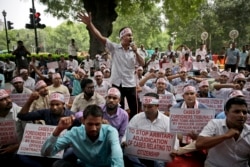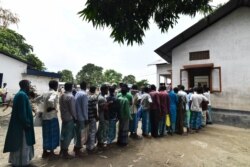India’s ruling Bharatiya Janata Party introduced a controversial bill in parliament Monday seeking to grant citizenship to non-Muslim illegal immigrants from neighboring countries, introducing religion as a criterion for nationality for the first time.
Opponents have slammed the proposed legislation as anti-Muslim and divisive and called it a ploy by Prime Minister Narendra Modi’s Hindu nationalist party to weaken the secular foundations of India’s democracy.
The bill will make six religious groups — Hindus, Sikhs, Christians, Jains, Parsis and Buddhists — who came to India from Pakistan, Bangladesh and Afghanistan before December 31st, 2014, eligible for Indian citizenship. The government says it is intended to give sanctuary to minorities who fled religious persecution in these countries.
Critics however have questioned why the proposed legislation has excluded Muslim minorities such as the Rohingyas in Myanmar, if it was meant to protect those facing religious persecution.
Home Minister Amit Shah strongly denied charges that the Citizenship Amendment Bill has an anti-Muslim bias. “This bill is not even point zero zero one percent against the minorities in this country,” he told lawmakers in the lower house of parliament.
The BJP has defended the proposed law saying it is confined to three Islamic countries where minorities such as Hindus and Sikhs often face harassment.
But many in the opposition benches slammed the bill as “regressive.” “It is nothing but a targeted legislation against the minority people of our country,” Adhir Ranjan Chowdhury, a lawmaker of the opposition Congress Party told parliament. Muslims are India’s largest minority and fear deepening religious polarization during Modi’s rule.
Another Congress leader, Shashi Tharoor, said the Bill violates the fundamental right to equality — India’s constitution prohibits religious discrimination and guarantees all persons equality before the law.
The BJP, which returned to power with a resounding majority in lower house six months ago, is confident of passing the bill, which was shelved during its previous term because it lacked a majority in the upper house of parliament.
It still lacks the numbers in the upper house, but hopes to pass the legislation with the help of friendly parties. Any bill needs to be ratified by both houses of Parliament to become law.
The bill has triggered fierce protests in recent days in the country’s northeastern state of Assam, where many fear that it will protect tens of thousands of Bengali Hindus who are among two million residents recently identified as illegal residents in the state.
The Assamese have long demanded the expulsion of all illegal immigrants irrespective of religion — the state bordering Bangladesh has faced a huge influx of refugees. That led to a massive exercise to root out illegal immigrants by publishing an updated citizens registry recently.
The government has said it plans to carry out a similar exercise throughout the country to identify all illegal immigrants by 2024.
That has raised unease among many political observers, who fear it will only target Muslims while safeguarding other religious groups. “It is unfortunate that our citizenship is getting linked to religious identity,” said political writer Nilanjan Mukhopadhyay. “We don’t know what all this will lead to. This is another significant step in keeping the majoritarian agenda of the BJP alive.” (( end it))






